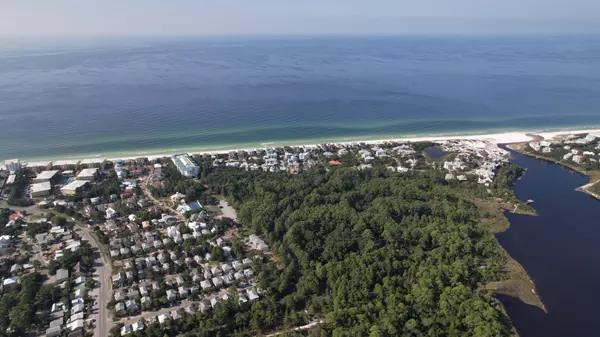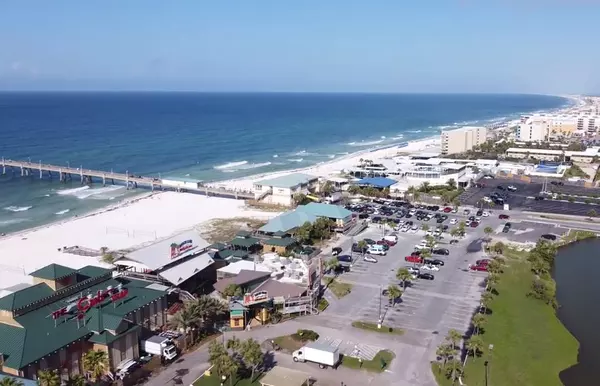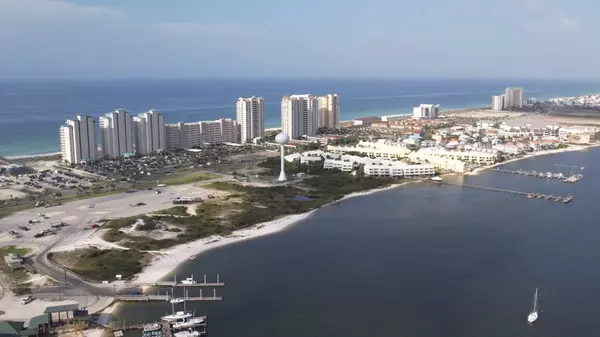Is NW Florida in Danger of A Hurricane
Is NW Florida in Danger of A Hurricane
So, is Northwest Florida in high risk for hurricane? And, should I really be worried about that if I'm considering moving to this area? Well, in this video, we're going to give you the things that you need to know and things that you don't necessarily need to worry about when it comes to that. So, stick around.
So, let's talk about hurricanes in Northwest Florida. What I'm referring to is more of the Emerald Coast area, which is anywhere between Pensacola all the way out to Panama City and just pretty close to Tallahassee. Now, where the time zone changes, that's kind of where we not necessarily concerned with. But with hurricanes, it's probably going to be pretty much the same.
So, when is hurricane season for us here in Florida, actually in the United States? It starts on June 1st and ends around November 30th. I believe those dates change every once in a while, but that's pretty good hard and fast rule there. As far as hurricanes, now what causes those? Why do we even get them here? Well, what happens is that we get some warm water, you get moist warm air and light upper-level winds. And this starts and this whole thing starts to begin when masses of those, that warm moist air comes up from the ocean surfaces and then starts to rise pretty quickly. In so doing, it collides with masses of cooler air, and then we start these tropical storms, which eventually can turn into a hurricane.
So, what classifies as a hurricane? So, there's five categories and they also named them and I don't know why they name them, but they name them. Right? So, your category one is when you have stable sustained winds between 74 to 95 miles per hour. Now anything less than 74 is just going to be considered a tropical storm. However, in that range is now considered a CAT-1 hurricane. Going to CAT-2, we've got winds anywhere between 96 to 110 miles per hour. Cat-3 are winds from 110 to a 130 miles per hour. Now, that in my mind is already like, whoa. Alright. Category 4, our winds from 131 to 155 sustained miles per hour that is. And then, we also have category 5, which are winds greater than 155 miles per hour. Okay?
What are some of the major hurricanes that actually hit our area? So, some of the major ones that did come through, we have in 2018 we had hurricane Michael. Now, hurricane Michael came through and hit Panama City. And, it was a Cat-4. And right before it hit landfall, I believe it went into a Cat-5. I had a 140 mile per hour or a 140 knots sustained wind, which was pretty incredible. It actually came through and took the tops off of some trees. If you drove down, it was absolutely insanity. Tyndall Air Force Base that was out there just completely decimated. It was a nasty storm, and that was in 2018. Prior to that, it'd been a long time since we'd seen a storm. It was 2004 with hurricane Ivan. Now, hurricane Ivan wasn't quite as bad as what we had as Hurricane Michael. But as far as the areas that it impacted, the Destin, Fort Walton Beach, Pensacola, it was pretty rough. Again, it wasn't as bad, it was a 105 knot winds, sustained winds that they had throughout this area. But Ivan did a number. When you look through and of course, this is a real estate channel, so we'll talk about that. A lot of the new roofs that we saw or went on in 2005, 2004, 2005, after Ivan came through and just ripped most of these things off. So, a lot of damage a lot of damage came through with Ivan in 2004. Now, prior to Ivan, we had hurricane Opal, and that was in 1995. So almost ten years prior to that was the last one. Again, it hit around Pensacola. It wasn't as intense as Ivan was, it was 100 knots sustained wind. And that still is a lot. I'm saying it's not as bad, but it's still pretty intense hurricane that came through in Hurricane Opal. Now, one thing to note going back to Ivan is we, the surges and things that came through were so massive that in Destin, you had Norriego Point. And it had taken a huge chunk of that sand and just dumped it into the bay. And it wasn't until only a few years ago that the money that they got from the BP spill, that they came out and rebuilt that peninsula by dredging the bay to get that sand to put it out on to Norriego Point. And now it looks really really great. And lots of extra spaces for you to go out on. Now, after hurricane Opal in 95, it was actually quite some time before that where we had another name hurricane that came through, which was in 1975. Eloise came through here and actually hit Destin and that was a 110 knots sustained wind. So, one of the the bigger storms that had come through in quite some time. And now, previous to that was in 1917, which that was before they started naming hurricanes and that hit Fort Walton Beach, and those were a 115 knots winds that came through sustained. So, as you can see, even since 1917, it's been over a hundred years, we've only had five major hurricanes that have come through this area. That's not really that bad. I don't know what it is about this area, but something comes through where those start to come up and then say, hey, you know, the old spaghetti models that they have for us. It's like, hey, there is a possibility that it's going to come up through this area. And it ends up shooting off one way or heading out towards Louisiana or something like that. So, a lot of the times for us locals here, we don't get to overly concerned as storms form in the gulf as they head out this way.
Now, I guess the biggest question is, and as the title of this video goes is, is Northwest Florida in danger? I mean, who really knows? Who can predict the weather? And when's the last time that you saw a prediction of what is the weather was supposed to be tomorrow or even in the next week. And it'll be completely off especially here in Florida where you'll look out and it's bright and sunny and then a couple of minutes later clouds and raining, and then hour later, it's cleared up completely. Like, it's crazy. So, I can't tell you anywhere for sure, but yet, there is a chance that hurricanes can come through here and tropical storms. But, because of that, we always want to be prepared. Right?
So, the first things that you want to know is you got to know your evacuation routes and have that plan. So, just in case something does come up and you don't want to stick it out and you want to head out of town, then know those routes and have that plan of where you're going and what to grab and everything else.
One other thing to do is to test out that hurricane protection. So, if you just bought a home, you just moved here and you have these hurricane shutters or the things that go over top of your window, which could be plywood, it could be the soft fabric that they put on top of it. Either one of those, definitely go out and test that. The time that you don't want to be testing it and seeing if it fits or if you have the correct hardware, right before hurricane hits where everybody else is going back out trying to get that in or trying to get those extra pieces if need be. So, go out and test them, put them on, see how long it takes for you to put that stuff on, and you could put that out in your plan of this is what we got to do prior to.
Also, make sure that you have a bag with applicable items for you and the whole family. In the military we called it a go bag because we're getting ready to go and we got to go quickly. Right? So, make sure that you have those things. A couple of things to keep in mind is to have battery chargers and that's just could be a charger for your phone. This is a battery like a lithium battery that you can charge as you're getting out of town if you don't get to an outlet or something like that, stuck in traffic, things of that nature. Having a battery operated lights is going to be really, really crucial, especially as the wind comes in, the power goes out. Same thing, these go bags could be, hey, we're getting out of town or we're hunkering down. Right? That also having cash just know with the other electricity going out, there's probably not going to be a whole lot of ATM still operating. So, having cash to get gas and things that you need will be vital. Have a radio, a battery operated radio so you can hear the alerts of it when it's free to move and things like that. Have it your important documents with you, any medications that you may need for yourself or your kids or your pets. Right? Make sure you have water with you as well. Expect that you're going to need at least a gallon per day per person. Have some food, at least some snacks, to help you kind of through everything, And of course, additional clothing because strangely enough, when everything comes through, you get soaking wet, even though it's 80 degrees with 100% humidity, you can still get cold. So, make sure that you do have some warm clothes to put on at least some dry clothes to help you through that time.
Also, be aware of surge areas throughout your area and areas of high flooding. It will flood. As these storms come through, it kind of takes all the water back. And as it gets closer, it just kind of surges back into our areas. So, know that it is going to flood. And don't trust that, hey, I can just push through this. We've seen plenty of times over and over and over again where vehicles are getting stuck because of the water in the surges.
But, the biggest advice that we can give you is, don't wait for a name storm to be in a gulf to get supplies. If you've seen this video, it's the day of 2022. We all remember when COVID started and we didn't have any toilet paper. Didn't make any sense. Right? Why toilet paper? Well, in this case, you want to make sure that you have all your hurricane gear. We have a bag here at my house. Make sure that, hey, if we're sticking it out that we have everything we need to be prepared. And, we also have go bags to get out of the house if need be, also have a plan for the pets.
Hopefully, this has been some good information for you and that way you'll be able to prepare when a hurricane actually does come through here. If you have any questions, please feel free to call/text us at 850.320.7757 or email us at Admin@WhittemoreGroupRE.com
Categories
Recent Posts










![<!-- begin Widget Tracker Code --> (function(w,i,d,g,e,t){w["WidgetTrackerObject"]=g;(w[g]=w[g]||function() {(w[g].q=w[g].q||[]).push(arguments);}),(w[g].ds=1*new Date());(e="script"), (t=d.createElement(e)),(e=d.getElementsByTagName(e)[0]);t.async=1;t.src=i; e.parentNode.insertBefore(t,e);}) (window,"https://widgetbe.com/agent",document,"widgetTracker"); window.widgetTracker("create", "WT-JTWWXHJC"); window.widgetTracker("send", "pageview"); <!-- end Widget Tracker Code -->](https://cdn.chime.me/image/fs/cmsbuild/2022820/12/h200_original_12b23b22-4a2a-4f96-8df9-274c8346f371-png.webp)